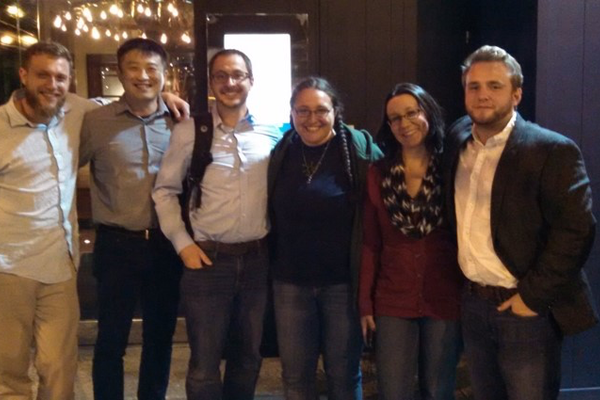
Ryan D Jankord, PhD
Education History
MS: Exercise Science, Ball State University (2002)
PhD: Biomedical Sciences, University of Missouri (2006)
Postdoctoral: Stress Neurobiology Laboratory, University of Cincinnati (2006-2010)
Research Statement
Adaptation Physiology
Our group explores the underlying mechanisms of physiology and behavior. The scientific question that drives our research is the following: “How do individuals adapt and what are the biological mechanisms that facilitate adaptation?”. This research explores how environmental conditions (stress, exercise, diet, electroceuticals) interact with biological mechanisms to modulate physiological functions. We utilize a variety of techniques (e.g. immunohistochemistry, neurobehavioral assays, brain stimulation, behavioral genetics models, sequencing, bioinformatics) to advance our understanding in this area. The integration of these approaches allows us to tackle challenging problems that require multiple skill sets, various disciplines and creative approaches.
The ability to adapt represents a general biological principal for organisms and is the central theme of our research. We are excited about identifying the bidirectional communication signals that occur between peripheral tissues and the brain and to understand how those signals are integrated to coordinate the appropriate physiological response to the environment. We focus on the neuroendocrine system as an important relay point between central processing and the release of circulating factors to peripheral tissues.
As the lead for the Neurobiology of Cognitive Performance research team at the Air Force Research Laboratory (AFRL) we have been advancing our understanding of the biological mechanisms of human performance. The primary projects include: 1) the biological signatures of human performance; and 2) the biological mechanisms of brain modulation. The first of these projects is focused on the identification of novel biological signatures that are predictive of stress resilience or susceptibility. We continue to identify and investigate biological targets that are predictive of performance in a high stress environment. The other project that we have been pursuing is the identification of the neurobiological pathways by which non-invasive electroceuticals (e.g. transcranial direct current stimulation; tDCS) affect the brain and impact behavior. One of the exciting parts about this work is that brain stimulation is able to induce adaptation factors that result in enhanced synaptic plasticity, giving us an experimental model to test local adaptation mechanisms within the brain that are critical for human performance.
Publications
1. Holmes B, Jung SH, Lu J, Wagner JA, Rubbi L, Pellegrini M & Jankord R. Transcriptomic modification in the cerebral cortex following non-invasive brain stimulation: RNA-sequencing approach. Neural Plasticity (in press)
2. Bikson M, Grossman P, Thomas C, Zannou AL, Jiang J, Adnan T, Mourdoukoutas AP, Kronberg G, Truong D, Boggio P, Brunoni AR, Charvet L, Fregni F, Fritsch B, Gillick B, Hamilton RH, Hampstead BM, Jankord R, Kirton A, Knotkova H, Liebetanz D, Liu A, Loo C, Nitsche MA, Reis J, Richardson JD, Rotenberg A, Turkeltaub PE, Woods AJ. Safety of transcranial direct current stimulation: evidence based update 2016. Brain Stimulation. Sep-Oct; 9(5) 641-61. 2016
3. Rohan J, Carhuatanta KA, McInturf S, Miklasevich M, Jankord R. Modulating hippocampal plasticity with in-vivo brain stimulation. The Journal of Neuroscience. Sep 16; 35(37): 12824-32. 2015
4. Shea CJA, Carhuatanta KA, Wagner J, Moore R, Bechmann N, Herman JP, Jankord R. Variable impact of chronic stress on spatial learning and memory in BXD mice. Physiology and Behavior. Oct 15; 150:69-77, 2015.
5. Solomon MB, Loftspring M, de Kloet A, Ghosal S, Carvalho-Netto E, Jankord R, Flak JN, Wulsin AC, Krause EG, Zhang R, Rice T, McKlveen J, Myers B, Tasker JG, Herman JP. Neuroendocrine function following hypothalamic depletion of glucocorticoid receptors in male and female mice. Endocrinology. Aug; 156(8): 2843-53, 2015.
6. Carhuatanta KA, Shae CJ, Herman JP, Jankord R. Unique genetic loci identified for emotional behavior in control and chronic stress conditions. Frontiers in Behavioral Neuroscience. Oct 21; 8:341, 2014.
7. Parasuraman R, Kidwell B, Olmstead R, Lin MK, Jankord R, Greenwood P. Interactive effects of the COMT gene and training on individual differences in supervisory control of unmanned vehicles. Human Factors. Jun; 56(4): 760-71, 2014.
8. Flak JN, Solomon MB, Jankord R, Krause EG, Herman JP. Identification of chronic stress-activated regions reveals a potential recruited circuit in rat brain. European Journal of Neuroscience. Aug; 36(4): 2547-55, 2012.
9. Jankord R, Solomon MB, Albertz J, Flak JN, Zhang R & Herman JP. Stress vulnerability during adolescent development in rats. Endocrinology. Feb; 152(2): 629-38, 2011.
10. Flak JN, Jankord R, Solomon MB, Krause EG & Herman JP. Opposing effects of chronic stress and weight restriction on cardiovascular, neuroendocrine and metabolic function. Physiology and Behavior. Aug 3; 104(2): 228-34, 2011.
11. Solomon MB, Jankord R, Flak JN & Herman JP. Chronic stress, energy balance and adiposity in female rats. Physiology and Behavior. Jan 10; 102(1): 84-90, 2011.
12. Varga J, Domokos A, Barna I, Jankord R, Bagdy G & Zelena D. Lack of vasopressin does not prevent the behavioural and endocrine changes induced by chronic unpredictable stress. Brain Research Bulletin. Jan 15; 84(1): 45-52, 2011.
13. Jankord R, Zhang R, Solomon MB, Flak J, Albertz J & Herman JP. Stress activation of IL-6 neurons in the hypothalamus. American Journal of Physiology: Regulatory, Integrative and Comparative Physiology. Jul; 299(1): R343-51, 2010.
14. Zhang R, Jankord R, Flak J, Solomon MB, D’Alessio DA & Herman, JP. Role of Glucocorticoids in tuning hindbrain stress integration. The Journal of Neuroscience. Nov 2; 30(44): 14907-14, 2010.
15. Jankord R, McAllister RM, Ganjam VK & Laughlin MH. Chronic inhibition of nitric oxide synthase augments the ACTH response to exercise. American Journal of Physiology: Regulatory, Integrative and Comparative Physiology. Mar; 296(3): R278-34, 2009.
16. Zelena D, Domokos A, Jain SK, Jankord R & Filaretova L. The stimuli-specific role of vasopressin in the hypothalamus-pituitary-adrenal axis response to stress. Journal of Endocrinology. Aug; 202(2): 263-78, 2009.
17. Jankord R & Herman JP. Limbic regulation of hypothalamo-pituitary-adrenocortical function during acute and chronic stress. Annals of the New York Academy of Sciences. Dec; 1148: 64-73, 2008.
18. Jankord R, Ganjam VK, Turk JR, Hamilton M & Laughlin MH. Exercise training alters effect of high fat feeding on the ACTH stress response in pigs. Applied Physiology, Nutrition and Metabolism. Jun; 33(3): 461-469, 2008.
19. Herman JP, Flak J & Jankord R. Chronic stress plasticity in the hypothalamic paraventricular nucleus. Progress in Brain Research. 170: 353-64, 2008.
20. Jankord R, Turk JR, Schadt JC, Casati J, Price EM, Ganjam VK, Keisler DH & Laughlin MH. Sex difference in link between interleukin-6 and stress. Endocrinology, Aug; 148(8): 3758-64, 2007.
21. Parra-Belky K, McCulloch K, Wick N, Shircliff R, Croft N, Margalef K, Brown J, Crabill T, Jankord R & Waldo, B. Immunoprecipitation and Characterization of Membrane Protein Complexes from Yeast. Biochemistry and Molecular Biology Education. Jul/Aug; 33(4): 289-292, 2005.
22. Jankord R & Jemiolo B. Influence of physical activity on serum IL-6 and IL-10 levels in healthy older men. Medicine and Science in Sports and Exercise. Jun; 36(6): 960-4, 2004.
Awards/Recognition
2016-2019 Air Force Office of Scientific Research (AFOSR) STAR Team Award
(Lead PI) Status recognition for top 10% of Air Force Research Laboratory basic science research teams for consistently producing world-class contributions to the Air Force and scientific community
2015 Harry G. Armstrong Scientific Excellence Award
Annual award of the 711th Human Performance Wing, AFRL
2015 Laboratory Scientist of the Quarter
Warfighter Interface Division, AFRL
2015 Jerome Ely Human Factors Article Award
Award for the most outstanding article in Human Factors during 2014
2009-2010 NIH NIMH Postdoctoral Fellowship (NRSA)
“Neurohypophysial control of the cytokine stress response”
(F32 MH084515, University of Cincinnati)
2007-2009 NIH NIDDK Postdoctoral Fellowship (NRSA) Training Program in Neuroendocrinology of Homeostasis
(T32 DK058903, University of Cincinnati)
Project: Brain control of cytokine production during acute and chronic stress.
2005-2006 NIH NIAMS Predoctoral Fellowship (NRSA)
Exercise and Health: Integration from Molecule to Patient
(T32 AR048523, University of Missouri)
Project: Cytokine regulation of hypothalamo-pituitary function during stress.
Active Research Grant Awards:
2016-2018 Air Force Office of Scientific Research (PI, $1.4M)
“Neurobiological effects of direct current stimulation”
2014-2016 Air Force Office of Scientific Research (PI, $709K)
“Genetic basis of stress resiliency”

